Nursing Project: End-of-Life Care Experiences in ICU Settings
VerifiedAdded on 2020/06/06
|18
|6605
|46
Project
AI Summary
This nursing project delves into the experiences, beliefs, and coping strategies of nurses providing end-of-life care in intensive care units (ICUs). The project begins with an introduction highlighting the stressors and rewards associated with end-of-life care, emphasizing the need for nurses to effectively manage grief and maintain resilience. A central research question explores nurses' experiences in the ICU setting. The project then presents an analysis of four primary research articles, each focusing on different aspects of end-of-life care, including emotional intelligence in emergency settings, nurses' beliefs and practices in the ICU, nurses' reactions to patient death, and ICU nurses' experiences caring for dying patients. The discussion synthesizes the findings, highlighting gaps in the existing literature, such as the need for further research on initiating reality-based discussions and the limited transferability of findings due to differences in medical care. The project underscores the emotional impact of patient death on nurses, the importance of family involvement, and the need for nurses to develop effective coping mechanisms to navigate the challenges of providing end-of-life care.
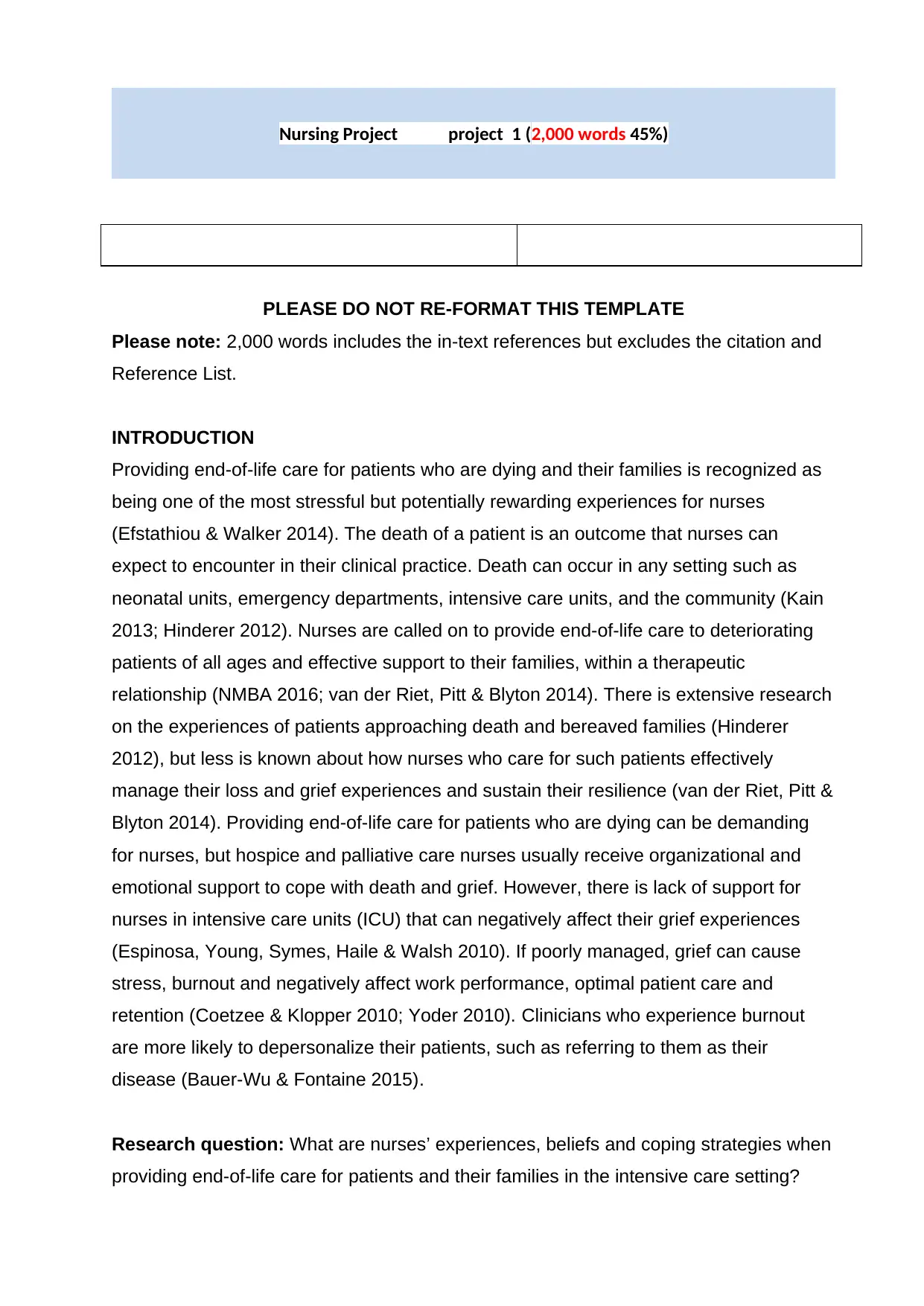
Nursing Project project 1 (2,000 words 45%)
PLEASE DO NOT RE-FORMAT THIS TEMPLATE
Please note: 2,000 words includes the in-text references but excludes the citation and
Reference List.
INTRODUCTION
Providing end-of-life care for patients who are dying and their families is recognized as
being one of the most stressful but potentially rewarding experiences for nurses
(Efstathiou & Walker 2014). The death of a patient is an outcome that nurses can
expect to encounter in their clinical practice. Death can occur in any setting such as
neonatal units, emergency departments, intensive care units, and the community (Kain
2013; Hinderer 2012). Nurses are called on to provide end-of-life care to deteriorating
patients of all ages and effective support to their families, within a therapeutic
relationship (NMBA 2016; van der Riet, Pitt & Blyton 2014). There is extensive research
on the experiences of patients approaching death and bereaved families (Hinderer
2012), but less is known about how nurses who care for such patients effectively
manage their loss and grief experiences and sustain their resilience (van der Riet, Pitt &
Blyton 2014). Providing end-of-life care for patients who are dying can be demanding
for nurses, but hospice and palliative care nurses usually receive organizational and
emotional support to cope with death and grief. However, there is lack of support for
nurses in intensive care units (ICU) that can negatively affect their grief experiences
(Espinosa, Young, Symes, Haile & Walsh 2010). If poorly managed, grief can cause
stress, burnout and negatively affect work performance, optimal patient care and
retention (Coetzee & Klopper 2010; Yoder 2010). Clinicians who experience burnout
are more likely to depersonalize their patients, such as referring to them as their
disease (Bauer-Wu & Fontaine 2015).
Research question: What are nurses’ experiences, beliefs and coping strategies when
providing end-of-life care for patients and their families in the intensive care setting?
PLEASE DO NOT RE-FORMAT THIS TEMPLATE
Please note: 2,000 words includes the in-text references but excludes the citation and
Reference List.
INTRODUCTION
Providing end-of-life care for patients who are dying and their families is recognized as
being one of the most stressful but potentially rewarding experiences for nurses
(Efstathiou & Walker 2014). The death of a patient is an outcome that nurses can
expect to encounter in their clinical practice. Death can occur in any setting such as
neonatal units, emergency departments, intensive care units, and the community (Kain
2013; Hinderer 2012). Nurses are called on to provide end-of-life care to deteriorating
patients of all ages and effective support to their families, within a therapeutic
relationship (NMBA 2016; van der Riet, Pitt & Blyton 2014). There is extensive research
on the experiences of patients approaching death and bereaved families (Hinderer
2012), but less is known about how nurses who care for such patients effectively
manage their loss and grief experiences and sustain their resilience (van der Riet, Pitt &
Blyton 2014). Providing end-of-life care for patients who are dying can be demanding
for nurses, but hospice and palliative care nurses usually receive organizational and
emotional support to cope with death and grief. However, there is lack of support for
nurses in intensive care units (ICU) that can negatively affect their grief experiences
(Espinosa, Young, Symes, Haile & Walsh 2010). If poorly managed, grief can cause
stress, burnout and negatively affect work performance, optimal patient care and
retention (Coetzee & Klopper 2010; Yoder 2010). Clinicians who experience burnout
are more likely to depersonalize their patients, such as referring to them as their
disease (Bauer-Wu & Fontaine 2015).
Research question: What are nurses’ experiences, beliefs and coping strategies when
providing end-of-life care for patients and their families in the intensive care setting?
Paraphrase This Document
Need a fresh take? Get an instant paraphrase of this document with our AI Paraphraser
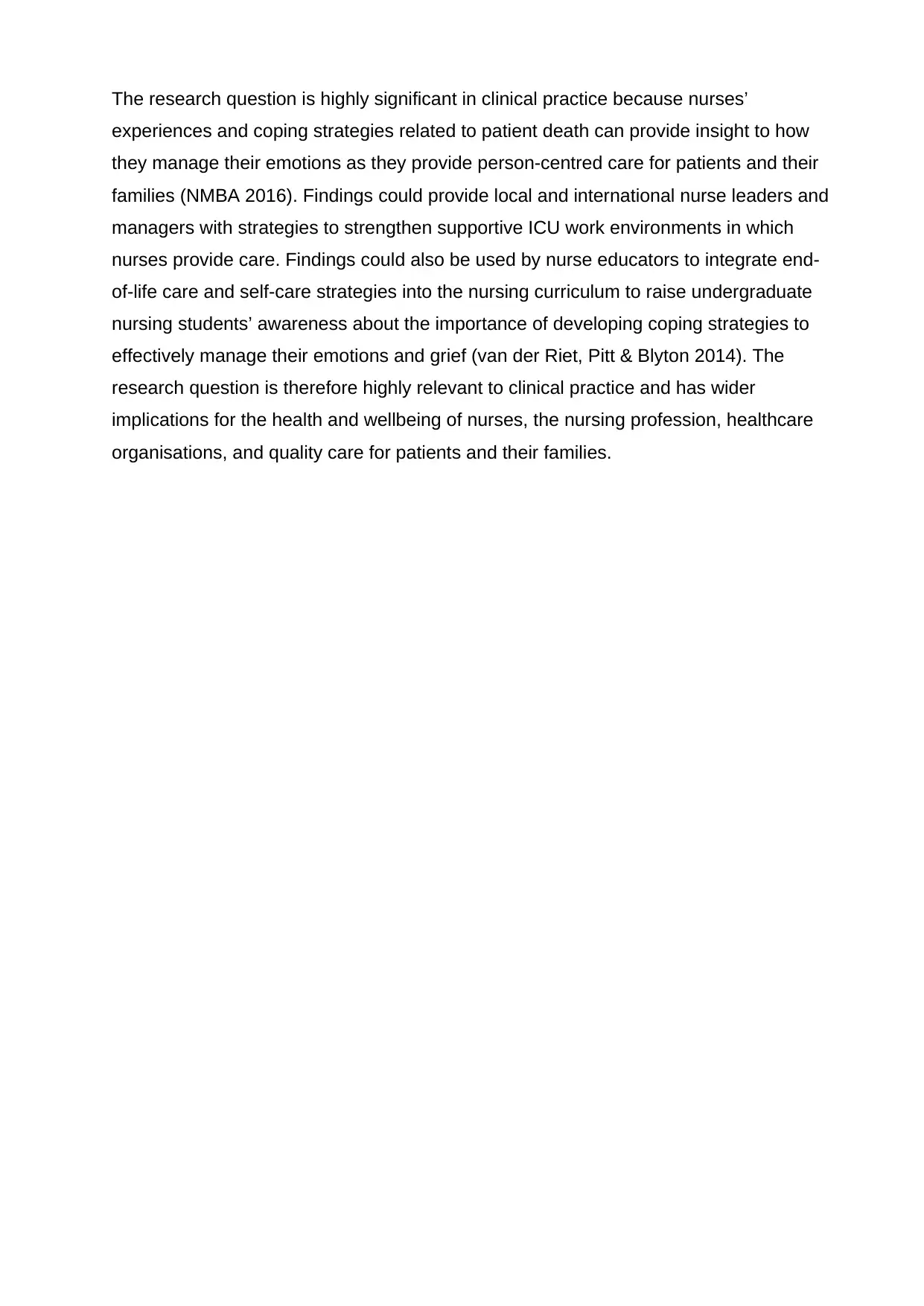
The research question is highly significant in clinical practice because nurses’
experiences and coping strategies related to patient death can provide insight to how
they manage their emotions as they provide person-centred care for patients and their
families (NMBA 2016). Findings could provide local and international nurse leaders and
managers with strategies to strengthen supportive ICU work environments in which
nurses provide care. Findings could also be used by nurse educators to integrate end-
of-life care and self-care strategies into the nursing curriculum to raise undergraduate
nursing students’ awareness about the importance of developing coping strategies to
effectively manage their emotions and grief (van der Riet, Pitt & Blyton 2014). The
research question is therefore highly relevant to clinical practice and has wider
implications for the health and wellbeing of nurses, the nursing profession, healthcare
organisations, and quality care for patients and their families.
experiences and coping strategies related to patient death can provide insight to how
they manage their emotions as they provide person-centred care for patients and their
families (NMBA 2016). Findings could provide local and international nurse leaders and
managers with strategies to strengthen supportive ICU work environments in which
nurses provide care. Findings could also be used by nurse educators to integrate end-
of-life care and self-care strategies into the nursing curriculum to raise undergraduate
nursing students’ awareness about the importance of developing coping strategies to
effectively manage their emotions and grief (van der Riet, Pitt & Blyton 2014). The
research question is therefore highly relevant to clinical practice and has wider
implications for the health and wellbeing of nurses, the nursing profession, healthcare
organisations, and quality care for patients and their families.
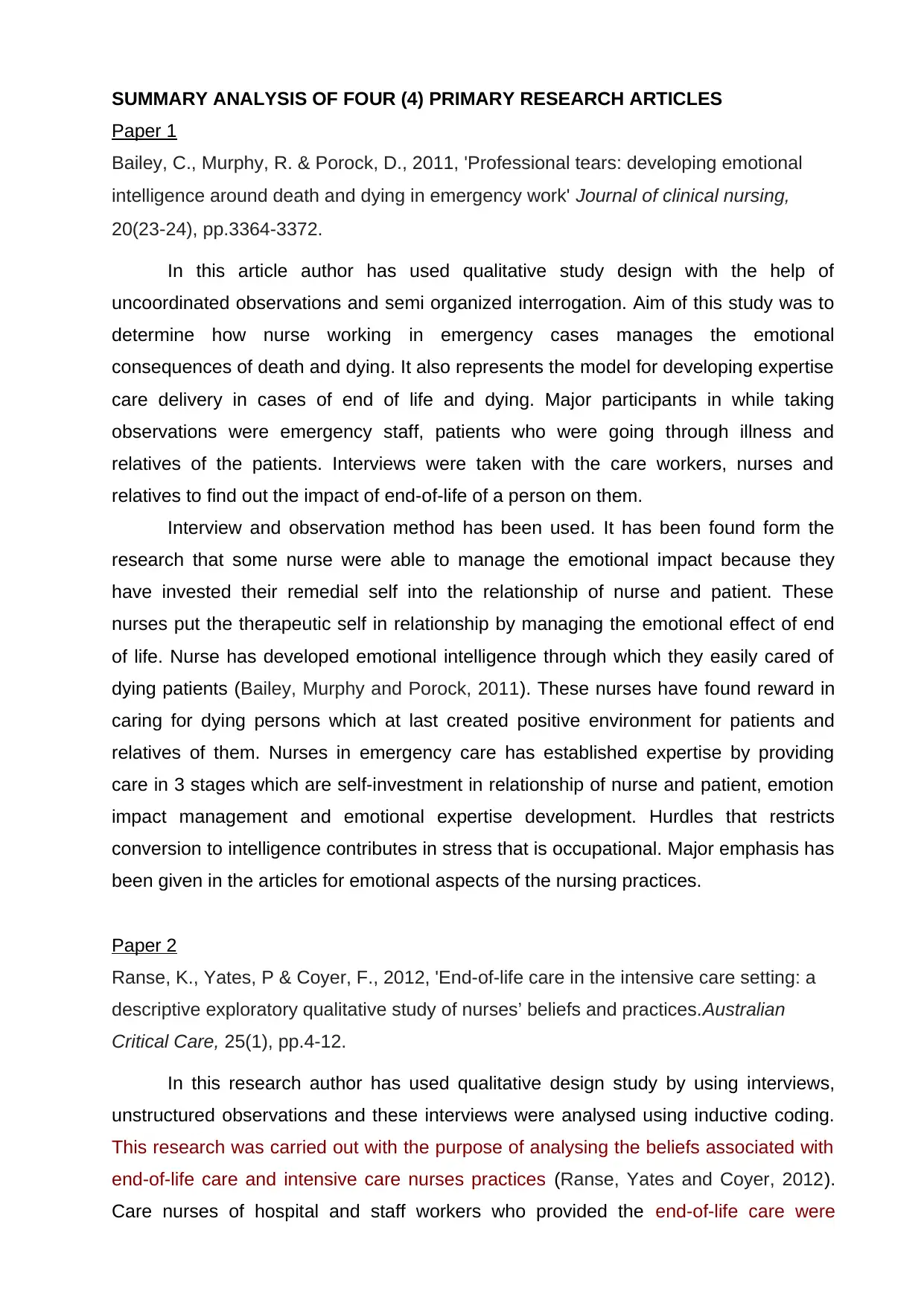
SUMMARY ANALYSIS OF FOUR (4) PRIMARY RESEARCH ARTICLES
Paper 1
Bailey, C., Murphy, R. & Porock, D., 2011, 'Professional tears: developing emotional
intelligence around death and dying in emergency work' Journal of clinical nursing,
20(23‐24), pp.3364-3372.
In this article author has used qualitative study design with the help of
uncoordinated observations and semi organized interrogation. Aim of this study was to
determine how nurse working in emergency cases manages the emotional
consequences of death and dying. It also represents the model for developing expertise
care delivery in cases of end of life and dying. Major participants in while taking
observations were emergency staff, patients who were going through illness and
relatives of the patients. Interviews were taken with the care workers, nurses and
relatives to find out the impact of end-of-life of a person on them.
Interview and observation method has been used. It has been found form the
research that some nurse were able to manage the emotional impact because they
have invested their remedial self into the relationship of nurse and patient. These
nurses put the therapeutic self in relationship by managing the emotional effect of end
of life. Nurse has developed emotional intelligence through which they easily cared of
dying patients (Bailey, Murphy and Porock, 2011). These nurses have found reward in
caring for dying persons which at last created positive environment for patients and
relatives of them. Nurses in emergency care has established expertise by providing
care in 3 stages which are self-investment in relationship of nurse and patient, emotion
impact management and emotional expertise development. Hurdles that restricts
conversion to intelligence contributes in stress that is occupational. Major emphasis has
been given in the articles for emotional aspects of the nursing practices.
Paper 2
Ranse, K., Yates, P & Coyer, F., 2012, 'End-of-life care in the intensive care setting: a
descriptive exploratory qualitative study of nurses’ beliefs and practices.Australian
Critical Care, 25(1), pp.4-12.
In this research author has used qualitative design study by using interviews,
unstructured observations and these interviews were analysed using inductive coding.
This research was carried out with the purpose of analysing the beliefs associated with
end-of-life care and intensive care nurses practices (Ranse, Yates and Coyer, 2012).
Care nurses of hospital and staff workers who provided the end-of-life care were
Paper 1
Bailey, C., Murphy, R. & Porock, D., 2011, 'Professional tears: developing emotional
intelligence around death and dying in emergency work' Journal of clinical nursing,
20(23‐24), pp.3364-3372.
In this article author has used qualitative study design with the help of
uncoordinated observations and semi organized interrogation. Aim of this study was to
determine how nurse working in emergency cases manages the emotional
consequences of death and dying. It also represents the model for developing expertise
care delivery in cases of end of life and dying. Major participants in while taking
observations were emergency staff, patients who were going through illness and
relatives of the patients. Interviews were taken with the care workers, nurses and
relatives to find out the impact of end-of-life of a person on them.
Interview and observation method has been used. It has been found form the
research that some nurse were able to manage the emotional impact because they
have invested their remedial self into the relationship of nurse and patient. These
nurses put the therapeutic self in relationship by managing the emotional effect of end
of life. Nurse has developed emotional intelligence through which they easily cared of
dying patients (Bailey, Murphy and Porock, 2011). These nurses have found reward in
caring for dying persons which at last created positive environment for patients and
relatives of them. Nurses in emergency care has established expertise by providing
care in 3 stages which are self-investment in relationship of nurse and patient, emotion
impact management and emotional expertise development. Hurdles that restricts
conversion to intelligence contributes in stress that is occupational. Major emphasis has
been given in the articles for emotional aspects of the nursing practices.
Paper 2
Ranse, K., Yates, P & Coyer, F., 2012, 'End-of-life care in the intensive care setting: a
descriptive exploratory qualitative study of nurses’ beliefs and practices.Australian
Critical Care, 25(1), pp.4-12.
In this research author has used qualitative design study by using interviews,
unstructured observations and these interviews were analysed using inductive coding.
This research was carried out with the purpose of analysing the beliefs associated with
end-of-life care and intensive care nurses practices (Ranse, Yates and Coyer, 2012).
Care nurses of hospital and staff workers who provided the end-of-life care were
⊘ This is a preview!⊘
Do you want full access?
Subscribe today to unlock all pages.

Trusted by 1+ million students worldwide
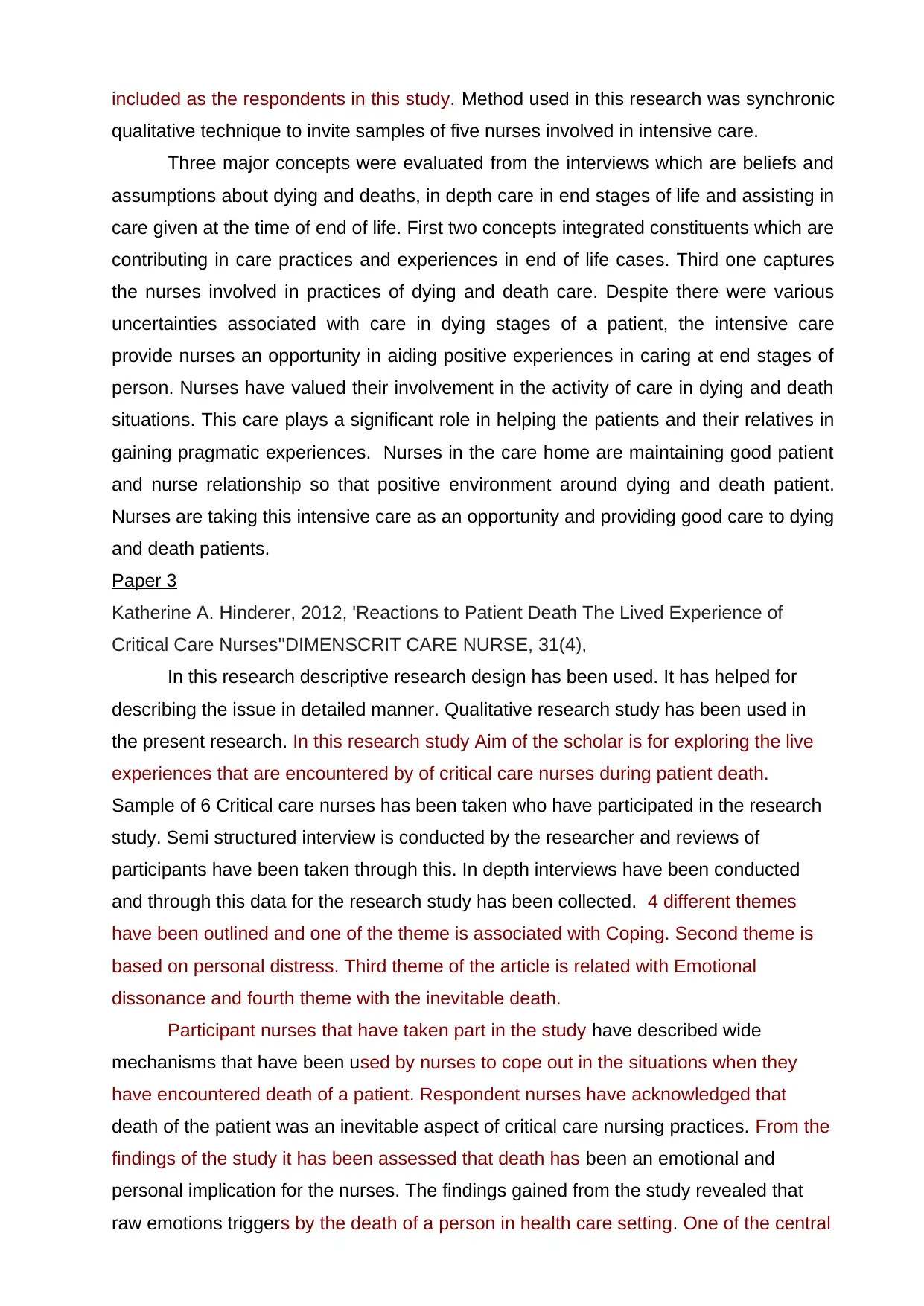
included as the respondents in this study. Method used in this research was synchronic
qualitative technique to invite samples of five nurses involved in intensive care.
Three major concepts were evaluated from the interviews which are beliefs and
assumptions about dying and deaths, in depth care in end stages of life and assisting in
care given at the time of end of life. First two concepts integrated constituents which are
contributing in care practices and experiences in end of life cases. Third one captures
the nurses involved in practices of dying and death care. Despite there were various
uncertainties associated with care in dying stages of a patient, the intensive care
provide nurses an opportunity in aiding positive experiences in caring at end stages of
person. Nurses have valued their involvement in the activity of care in dying and death
situations. This care plays a significant role in helping the patients and their relatives in
gaining pragmatic experiences. Nurses in the care home are maintaining good patient
and nurse relationship so that positive environment around dying and death patient.
Nurses are taking this intensive care as an opportunity and providing good care to dying
and death patients.
Paper 3
Katherine A. Hinderer, 2012, 'Reactions to Patient Death The Lived Experience of
Critical Care Nurses''DIMENSCRIT CARE NURSE, 31(4),
In this research descriptive research design has been used. It has helped for
describing the issue in detailed manner. Qualitative research study has been used in
the present research. In this research study Aim of the scholar is for exploring the live
experiences that are encountered by of critical care nurses during patient death.
Sample of 6 Critical care nurses has been taken who have participated in the research
study. Semi structured interview is conducted by the researcher and reviews of
participants have been taken through this. In depth interviews have been conducted
and through this data for the research study has been collected. 4 different themes
have been outlined and one of the theme is associated with Coping. Second theme is
based on personal distress. Third theme of the article is related with Emotional
dissonance and fourth theme with the inevitable death.
Participant nurses that have taken part in the study have described wide
mechanisms that have been used by nurses to cope out in the situations when they
have encountered death of a patient. Respondent nurses have acknowledged that
death of the patient was an inevitable aspect of critical care nursing practices. From the
findings of the study it has been assessed that death has been an emotional and
personal implication for the nurses. The findings gained from the study revealed that
raw emotions triggers by the death of a person in health care setting. One of the central
qualitative technique to invite samples of five nurses involved in intensive care.
Three major concepts were evaluated from the interviews which are beliefs and
assumptions about dying and deaths, in depth care in end stages of life and assisting in
care given at the time of end of life. First two concepts integrated constituents which are
contributing in care practices and experiences in end of life cases. Third one captures
the nurses involved in practices of dying and death care. Despite there were various
uncertainties associated with care in dying stages of a patient, the intensive care
provide nurses an opportunity in aiding positive experiences in caring at end stages of
person. Nurses have valued their involvement in the activity of care in dying and death
situations. This care plays a significant role in helping the patients and their relatives in
gaining pragmatic experiences. Nurses in the care home are maintaining good patient
and nurse relationship so that positive environment around dying and death patient.
Nurses are taking this intensive care as an opportunity and providing good care to dying
and death patients.
Paper 3
Katherine A. Hinderer, 2012, 'Reactions to Patient Death The Lived Experience of
Critical Care Nurses''DIMENSCRIT CARE NURSE, 31(4),
In this research descriptive research design has been used. It has helped for
describing the issue in detailed manner. Qualitative research study has been used in
the present research. In this research study Aim of the scholar is for exploring the live
experiences that are encountered by of critical care nurses during patient death.
Sample of 6 Critical care nurses has been taken who have participated in the research
study. Semi structured interview is conducted by the researcher and reviews of
participants have been taken through this. In depth interviews have been conducted
and through this data for the research study has been collected. 4 different themes
have been outlined and one of the theme is associated with Coping. Second theme is
based on personal distress. Third theme of the article is related with Emotional
dissonance and fourth theme with the inevitable death.
Participant nurses that have taken part in the study have described wide
mechanisms that have been used by nurses to cope out in the situations when they
have encountered death of a patient. Respondent nurses have acknowledged that
death of the patient was an inevitable aspect of critical care nursing practices. From the
findings of the study it has been assessed that death has been an emotional and
personal implication for the nurses. The findings gained from the study revealed that
raw emotions triggers by the death of a person in health care setting. One of the central
Paraphrase This Document
Need a fresh take? Get an instant paraphrase of this document with our AI Paraphraser
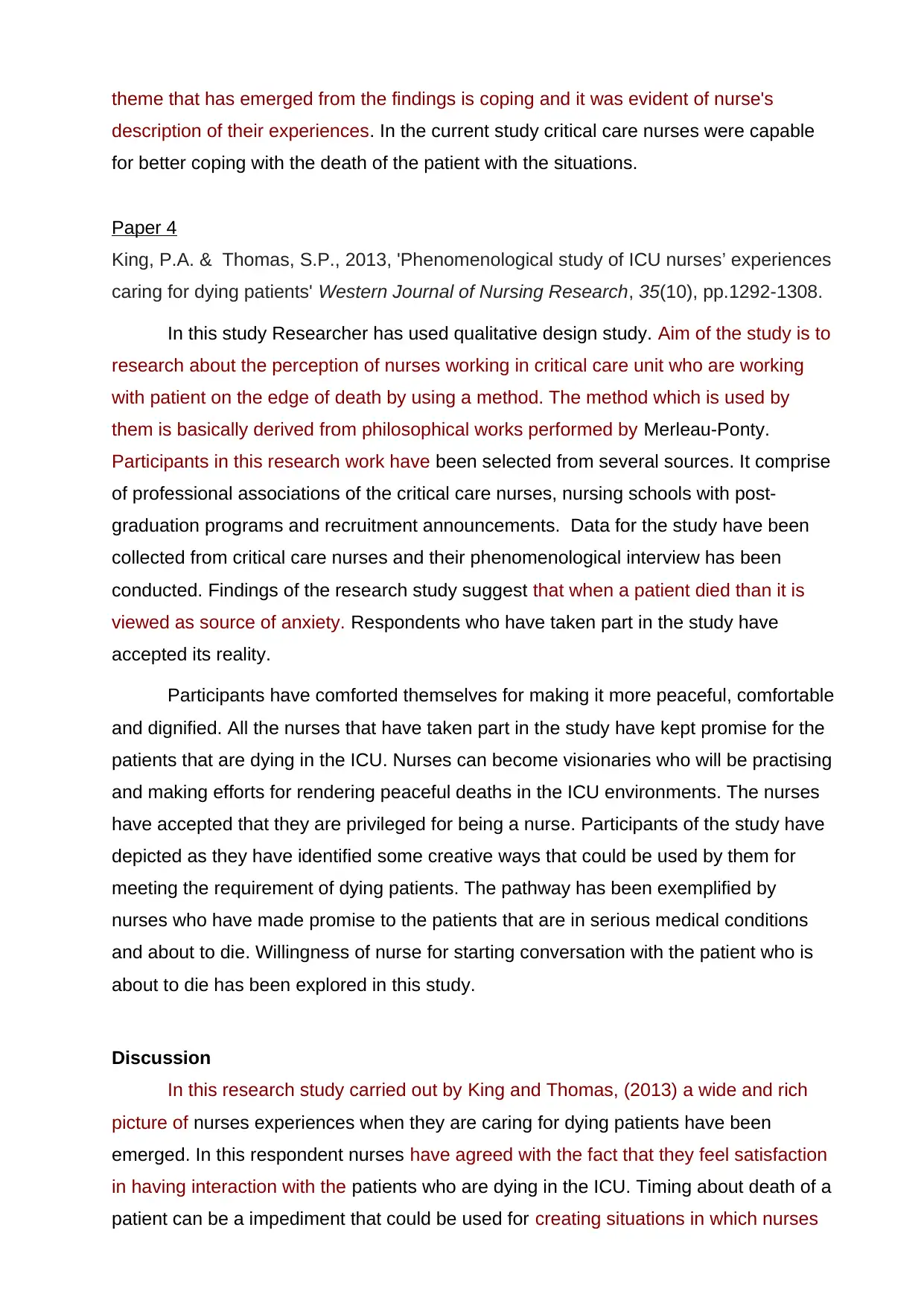
theme that has emerged from the findings is coping and it was evident of nurse's
description of their experiences. In the current study critical care nurses were capable
for better coping with the death of the patient with the situations.
Paper 4
King, P.A. & Thomas, S.P., 2013, 'Phenomenological study of ICU nurses’ experiences
caring for dying patients' Western Journal of Nursing Research, 35(10), pp.1292-1308.
In this study Researcher has used qualitative design study. Aim of the study is to
research about the perception of nurses working in critical care unit who are working
with patient on the edge of death by using a method. The method which is used by
them is basically derived from philosophical works performed by Merleau-Ponty.
Participants in this research work have been selected from several sources. It comprise
of professional associations of the critical care nurses, nursing schools with post-
graduation programs and recruitment announcements. Data for the study have been
collected from critical care nurses and their phenomenological interview has been
conducted. Findings of the research study suggest that when a patient died than it is
viewed as source of anxiety. Respondents who have taken part in the study have
accepted its reality.
Participants have comforted themselves for making it more peaceful, comfortable
and dignified. All the nurses that have taken part in the study have kept promise for the
patients that are dying in the ICU. Nurses can become visionaries who will be practising
and making efforts for rendering peaceful deaths in the ICU environments. The nurses
have accepted that they are privileged for being a nurse. Participants of the study have
depicted as they have identified some creative ways that could be used by them for
meeting the requirement of dying patients. The pathway has been exemplified by
nurses who have made promise to the patients that are in serious medical conditions
and about to die. Willingness of nurse for starting conversation with the patient who is
about to die has been explored in this study.
Discussion
In this research study carried out by King and Thomas, (2013) a wide and rich
picture of nurses experiences when they are caring for dying patients have been
emerged. In this respondent nurses have agreed with the fact that they feel satisfaction
in having interaction with the patients who are dying in the ICU. Timing about death of a
patient can be a impediment that could be used for creating situations in which nurses
description of their experiences. In the current study critical care nurses were capable
for better coping with the death of the patient with the situations.
Paper 4
King, P.A. & Thomas, S.P., 2013, 'Phenomenological study of ICU nurses’ experiences
caring for dying patients' Western Journal of Nursing Research, 35(10), pp.1292-1308.
In this study Researcher has used qualitative design study. Aim of the study is to
research about the perception of nurses working in critical care unit who are working
with patient on the edge of death by using a method. The method which is used by
them is basically derived from philosophical works performed by Merleau-Ponty.
Participants in this research work have been selected from several sources. It comprise
of professional associations of the critical care nurses, nursing schools with post-
graduation programs and recruitment announcements. Data for the study have been
collected from critical care nurses and their phenomenological interview has been
conducted. Findings of the research study suggest that when a patient died than it is
viewed as source of anxiety. Respondents who have taken part in the study have
accepted its reality.
Participants have comforted themselves for making it more peaceful, comfortable
and dignified. All the nurses that have taken part in the study have kept promise for the
patients that are dying in the ICU. Nurses can become visionaries who will be practising
and making efforts for rendering peaceful deaths in the ICU environments. The nurses
have accepted that they are privileged for being a nurse. Participants of the study have
depicted as they have identified some creative ways that could be used by them for
meeting the requirement of dying patients. The pathway has been exemplified by
nurses who have made promise to the patients that are in serious medical conditions
and about to die. Willingness of nurse for starting conversation with the patient who is
about to die has been explored in this study.
Discussion
In this research study carried out by King and Thomas, (2013) a wide and rich
picture of nurses experiences when they are caring for dying patients have been
emerged. In this respondent nurses have agreed with the fact that they feel satisfaction
in having interaction with the patients who are dying in the ICU. Timing about death of a
patient can be a impediment that could be used for creating situations in which nurses
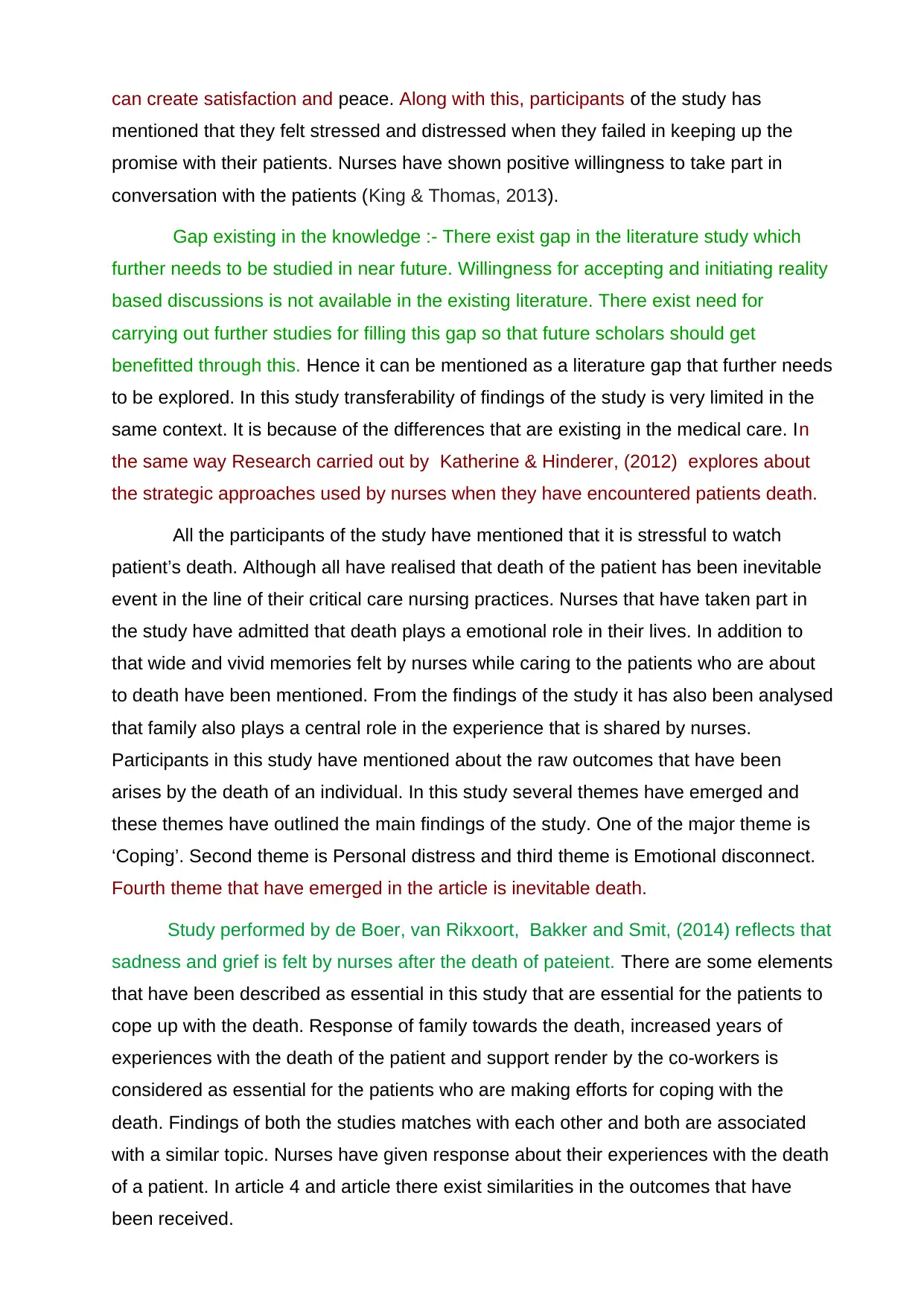
can create satisfaction and peace. Along with this, participants of the study has
mentioned that they felt stressed and distressed when they failed in keeping up the
promise with their patients. Nurses have shown positive willingness to take part in
conversation with the patients (King & Thomas, 2013).
Gap existing in the knowledge :- There exist gap in the literature study which
further needs to be studied in near future. Willingness for accepting and initiating reality
based discussions is not available in the existing literature. There exist need for
carrying out further studies for filling this gap so that future scholars should get
benefitted through this. Hence it can be mentioned as a literature gap that further needs
to be explored. In this study transferability of findings of the study is very limited in the
same context. It is because of the differences that are existing in the medical care. In
the same way Research carried out by Katherine & Hinderer, (2012) explores about
the strategic approaches used by nurses when they have encountered patients death.
All the participants of the study have mentioned that it is stressful to watch
patient’s death. Although all have realised that death of the patient has been inevitable
event in the line of their critical care nursing practices. Nurses that have taken part in
the study have admitted that death plays a emotional role in their lives. In addition to
that wide and vivid memories felt by nurses while caring to the patients who are about
to death have been mentioned. From the findings of the study it has also been analysed
that family also plays a central role in the experience that is shared by nurses.
Participants in this study have mentioned about the raw outcomes that have been
arises by the death of an individual. In this study several themes have emerged and
these themes have outlined the main findings of the study. One of the major theme is
‘Coping’. Second theme is Personal distress and third theme is Emotional disconnect.
Fourth theme that have emerged in the article is inevitable death.
Study performed by de Boer, van Rikxoort, Bakker and Smit, (2014) reflects that
sadness and grief is felt by nurses after the death of pateient. There are some elements
that have been described as essential in this study that are essential for the patients to
cope up with the death. Response of family towards the death, increased years of
experiences with the death of the patient and support render by the co-workers is
considered as essential for the patients who are making efforts for coping with the
death. Findings of both the studies matches with each other and both are associated
with a similar topic. Nurses have given response about their experiences with the death
of a patient. In article 4 and article there exist similarities in the outcomes that have
been received.
mentioned that they felt stressed and distressed when they failed in keeping up the
promise with their patients. Nurses have shown positive willingness to take part in
conversation with the patients (King & Thomas, 2013).
Gap existing in the knowledge :- There exist gap in the literature study which
further needs to be studied in near future. Willingness for accepting and initiating reality
based discussions is not available in the existing literature. There exist need for
carrying out further studies for filling this gap so that future scholars should get
benefitted through this. Hence it can be mentioned as a literature gap that further needs
to be explored. In this study transferability of findings of the study is very limited in the
same context. It is because of the differences that are existing in the medical care. In
the same way Research carried out by Katherine & Hinderer, (2012) explores about
the strategic approaches used by nurses when they have encountered patients death.
All the participants of the study have mentioned that it is stressful to watch
patient’s death. Although all have realised that death of the patient has been inevitable
event in the line of their critical care nursing practices. Nurses that have taken part in
the study have admitted that death plays a emotional role in their lives. In addition to
that wide and vivid memories felt by nurses while caring to the patients who are about
to death have been mentioned. From the findings of the study it has also been analysed
that family also plays a central role in the experience that is shared by nurses.
Participants in this study have mentioned about the raw outcomes that have been
arises by the death of an individual. In this study several themes have emerged and
these themes have outlined the main findings of the study. One of the major theme is
‘Coping’. Second theme is Personal distress and third theme is Emotional disconnect.
Fourth theme that have emerged in the article is inevitable death.
Study performed by de Boer, van Rikxoort, Bakker and Smit, (2014) reflects that
sadness and grief is felt by nurses after the death of pateient. There are some elements
that have been described as essential in this study that are essential for the patients to
cope up with the death. Response of family towards the death, increased years of
experiences with the death of the patient and support render by the co-workers is
considered as essential for the patients who are making efforts for coping with the
death. Findings of both the studies matches with each other and both are associated
with a similar topic. Nurses have given response about their experiences with the death
of a patient. In article 4 and article there exist similarities in the outcomes that have
been received.
⊘ This is a preview!⊘
Do you want full access?
Subscribe today to unlock all pages.

Trusted by 1+ million students worldwide
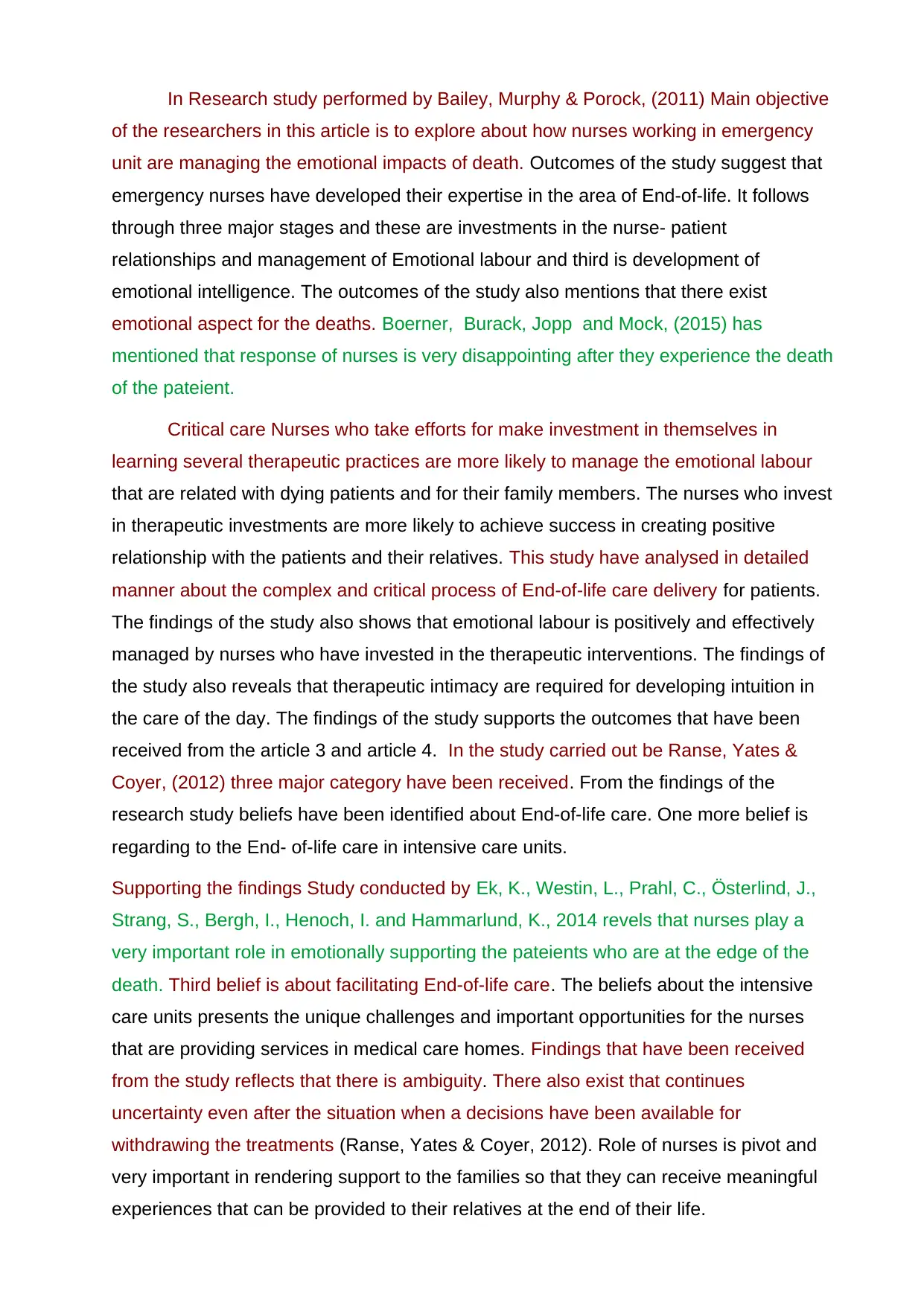
In Research study performed by Bailey, Murphy & Porock, (2011) Main objective
of the researchers in this article is to explore about how nurses working in emergency
unit are managing the emotional impacts of death. Outcomes of the study suggest that
emergency nurses have developed their expertise in the area of End-of-life. It follows
through three major stages and these are investments in the nurse- patient
relationships and management of Emotional labour and third is development of
emotional intelligence. The outcomes of the study also mentions that there exist
emotional aspect for the deaths. Boerner, Burack, Jopp and Mock, (2015) has
mentioned that response of nurses is very disappointing after they experience the death
of the pateient.
Critical care Nurses who take efforts for make investment in themselves in
learning several therapeutic practices are more likely to manage the emotional labour
that are related with dying patients and for their family members. The nurses who invest
in therapeutic investments are more likely to achieve success in creating positive
relationship with the patients and their relatives. This study have analysed in detailed
manner about the complex and critical process of End-of-life care delivery for patients.
The findings of the study also shows that emotional labour is positively and effectively
managed by nurses who have invested in the therapeutic interventions. The findings of
the study also reveals that therapeutic intimacy are required for developing intuition in
the care of the day. The findings of the study supports the outcomes that have been
received from the article 3 and article 4. In the study carried out be Ranse, Yates &
Coyer, (2012) three major category have been received. From the findings of the
research study beliefs have been identified about End-of-life care. One more belief is
regarding to the End- of-life care in intensive care units.
Supporting the findings Study conducted by Ek, K., Westin, L., Prahl, C., Österlind, J.,
Strang, S., Bergh, I., Henoch, I. and Hammarlund, K., 2014 revels that nurses play a
very important role in emotionally supporting the pateients who are at the edge of the
death. Third belief is about facilitating End-of-life care. The beliefs about the intensive
care units presents the unique challenges and important opportunities for the nurses
that are providing services in medical care homes. Findings that have been received
from the study reflects that there is ambiguity. There also exist that continues
uncertainty even after the situation when a decisions have been available for
withdrawing the treatments (Ranse, Yates & Coyer, 2012). Role of nurses is pivot and
very important in rendering support to the families so that they can receive meaningful
experiences that can be provided to their relatives at the end of their life.
of the researchers in this article is to explore about how nurses working in emergency
unit are managing the emotional impacts of death. Outcomes of the study suggest that
emergency nurses have developed their expertise in the area of End-of-life. It follows
through three major stages and these are investments in the nurse- patient
relationships and management of Emotional labour and third is development of
emotional intelligence. The outcomes of the study also mentions that there exist
emotional aspect for the deaths. Boerner, Burack, Jopp and Mock, (2015) has
mentioned that response of nurses is very disappointing after they experience the death
of the pateient.
Critical care Nurses who take efforts for make investment in themselves in
learning several therapeutic practices are more likely to manage the emotional labour
that are related with dying patients and for their family members. The nurses who invest
in therapeutic investments are more likely to achieve success in creating positive
relationship with the patients and their relatives. This study have analysed in detailed
manner about the complex and critical process of End-of-life care delivery for patients.
The findings of the study also shows that emotional labour is positively and effectively
managed by nurses who have invested in the therapeutic interventions. The findings of
the study also reveals that therapeutic intimacy are required for developing intuition in
the care of the day. The findings of the study supports the outcomes that have been
received from the article 3 and article 4. In the study carried out be Ranse, Yates &
Coyer, (2012) three major category have been received. From the findings of the
research study beliefs have been identified about End-of-life care. One more belief is
regarding to the End- of-life care in intensive care units.
Supporting the findings Study conducted by Ek, K., Westin, L., Prahl, C., Österlind, J.,
Strang, S., Bergh, I., Henoch, I. and Hammarlund, K., 2014 revels that nurses play a
very important role in emotionally supporting the pateients who are at the edge of the
death. Third belief is about facilitating End-of-life care. The beliefs about the intensive
care units presents the unique challenges and important opportunities for the nurses
that are providing services in medical care homes. Findings that have been received
from the study reflects that there is ambiguity. There also exist that continues
uncertainty even after the situation when a decisions have been available for
withdrawing the treatments (Ranse, Yates & Coyer, 2012). Role of nurses is pivot and
very important in rendering support to the families so that they can receive meaningful
experiences that can be provided to their relatives at the end of their life.
Paraphrase This Document
Need a fresh take? Get an instant paraphrase of this document with our AI Paraphraser
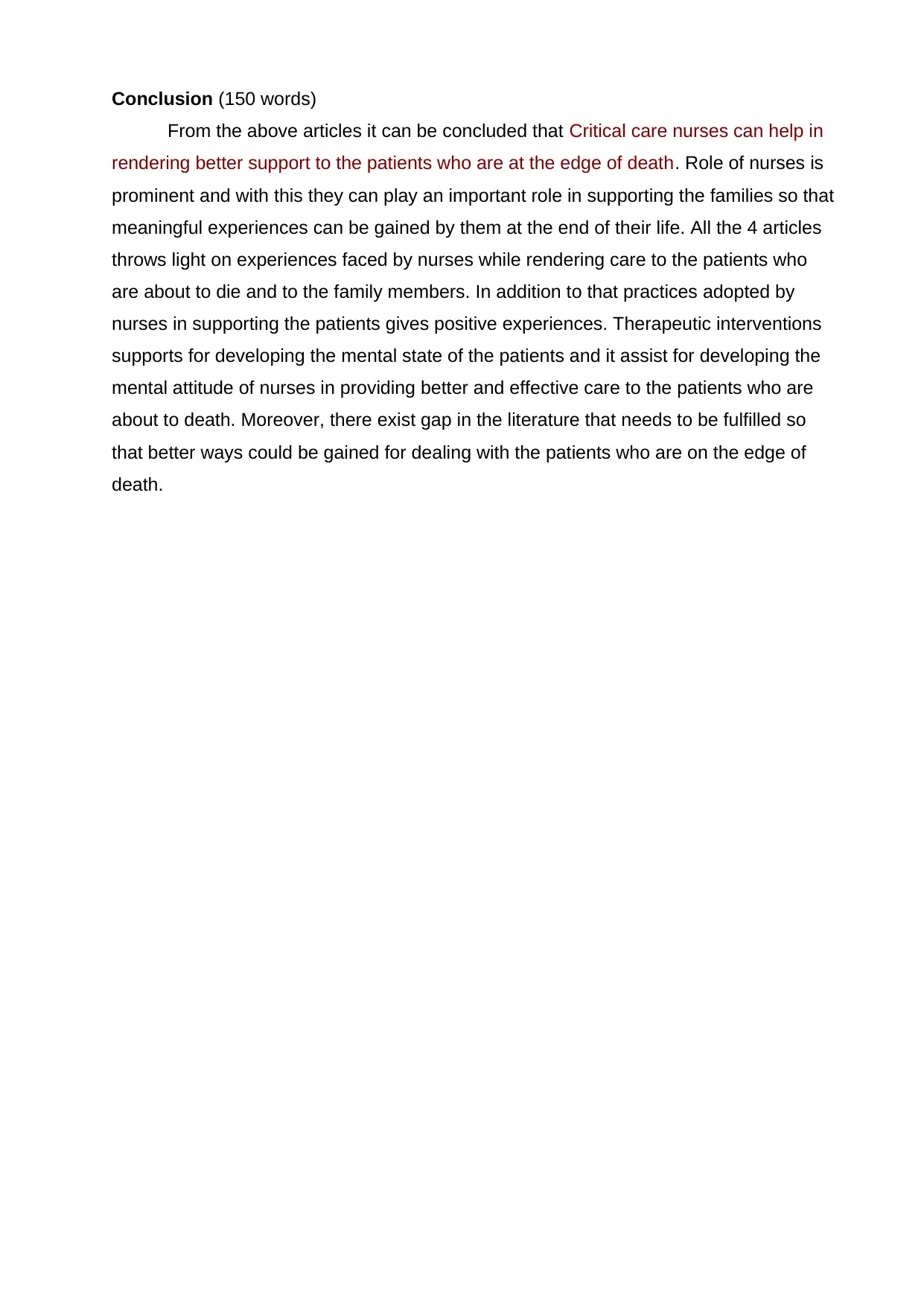
Conclusion (150 words)
From the above articles it can be concluded that Critical care nurses can help in
rendering better support to the patients who are at the edge of death. Role of nurses is
prominent and with this they can play an important role in supporting the families so that
meaningful experiences can be gained by them at the end of their life. All the 4 articles
throws light on experiences faced by nurses while rendering care to the patients who
are about to die and to the family members. In addition to that practices adopted by
nurses in supporting the patients gives positive experiences. Therapeutic interventions
supports for developing the mental state of the patients and it assist for developing the
mental attitude of nurses in providing better and effective care to the patients who are
about to death. Moreover, there exist gap in the literature that needs to be fulfilled so
that better ways could be gained for dealing with the patients who are on the edge of
death.
From the above articles it can be concluded that Critical care nurses can help in
rendering better support to the patients who are at the edge of death. Role of nurses is
prominent and with this they can play an important role in supporting the families so that
meaningful experiences can be gained by them at the end of their life. All the 4 articles
throws light on experiences faced by nurses while rendering care to the patients who
are about to die and to the family members. In addition to that practices adopted by
nurses in supporting the patients gives positive experiences. Therapeutic interventions
supports for developing the mental state of the patients and it assist for developing the
mental attitude of nurses in providing better and effective care to the patients who are
about to death. Moreover, there exist gap in the literature that needs to be fulfilled so
that better ways could be gained for dealing with the patients who are on the edge of
death.
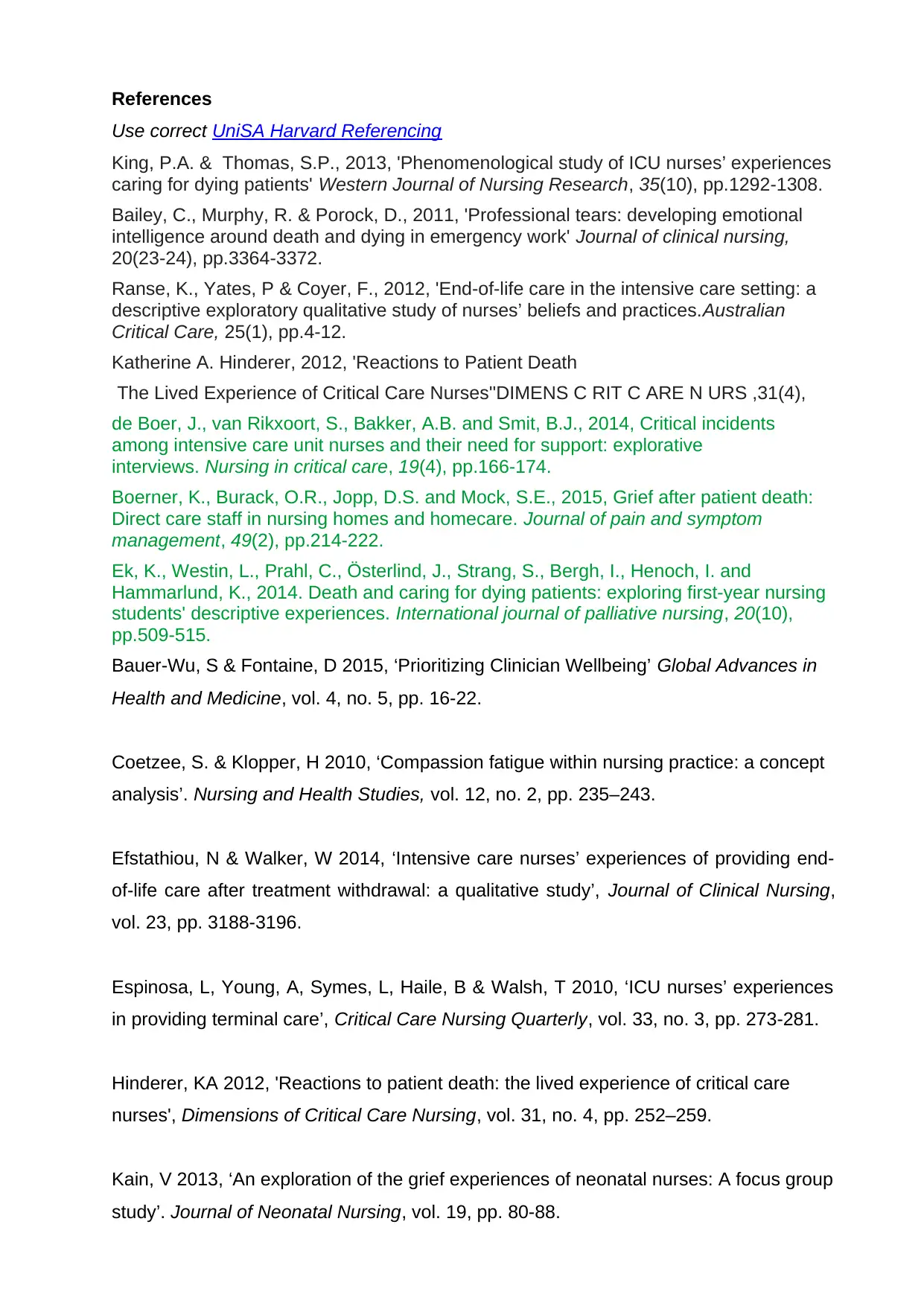
References
Use correct UniSA Harvard Referencing
King, P.A. & Thomas, S.P., 2013, 'Phenomenological study of ICU nurses’ experiences
caring for dying patients' Western Journal of Nursing Research, 35(10), pp.1292-1308.
Bailey, C., Murphy, R. & Porock, D., 2011, 'Professional tears: developing emotional
intelligence around death and dying in emergency work' Journal of clinical nursing,
20(23‐24), pp.3364-3372.
Ranse, K., Yates, P & Coyer, F., 2012, 'End-of-life care in the intensive care setting: a
descriptive exploratory qualitative study of nurses’ beliefs and practices.Australian
Critical Care, 25(1), pp.4-12.
Katherine A. Hinderer, 2012, 'Reactions to Patient Death
The Lived Experience of Critical Care Nurses''DIMENS C RIT C ARE N URS ,31(4),
de Boer, J., van Rikxoort, S., Bakker, A.B. and Smit, B.J., 2014, Critical incidents
among intensive care unit nurses and their need for support: explorative
interviews. Nursing in critical care, 19(4), pp.166-174.
Boerner, K., Burack, O.R., Jopp, D.S. and Mock, S.E., 2015, Grief after patient death:
Direct care staff in nursing homes and homecare. Journal of pain and symptom
management, 49(2), pp.214-222.
Ek, K., Westin, L., Prahl, C., Österlind, J., Strang, S., Bergh, I., Henoch, I. and
Hammarlund, K., 2014. Death and caring for dying patients: exploring first-year nursing
students' descriptive experiences. International journal of palliative nursing, 20(10),
pp.509-515.
Bauer-Wu, S & Fontaine, D 2015, ‘Prioritizing Clinician Wellbeing’ Global Advances in
Health and Medicine, vol. 4, no. 5, pp. 16-22.
Coetzee, S. & Klopper, H 2010, ‘Compassion fatigue within nursing practice: a concept
analysis’. Nursing and Health Studies, vol. 12, no. 2, pp. 235–243.
Efstathiou, N & Walker, W 2014, ‘Intensive care nurses’ experiences of providing end-
of-life care after treatment withdrawal: a qualitative study’, Journal of Clinical Nursing,
vol. 23, pp. 3188-3196.
Espinosa, L, Young, A, Symes, L, Haile, B & Walsh, T 2010, ‘ICU nurses’ experiences
in providing terminal care’, Critical Care Nursing Quarterly, vol. 33, no. 3, pp. 273-281.
Hinderer, KA 2012, 'Reactions to patient death: the lived experience of critical care
nurses', Dimensions of Critical Care Nursing, vol. 31, no. 4, pp. 252–259.
Kain, V 2013, ‘An exploration of the grief experiences of neonatal nurses: A focus group
study’. Journal of Neonatal Nursing, vol. 19, pp. 80-88.
Use correct UniSA Harvard Referencing
King, P.A. & Thomas, S.P., 2013, 'Phenomenological study of ICU nurses’ experiences
caring for dying patients' Western Journal of Nursing Research, 35(10), pp.1292-1308.
Bailey, C., Murphy, R. & Porock, D., 2011, 'Professional tears: developing emotional
intelligence around death and dying in emergency work' Journal of clinical nursing,
20(23‐24), pp.3364-3372.
Ranse, K., Yates, P & Coyer, F., 2012, 'End-of-life care in the intensive care setting: a
descriptive exploratory qualitative study of nurses’ beliefs and practices.Australian
Critical Care, 25(1), pp.4-12.
Katherine A. Hinderer, 2012, 'Reactions to Patient Death
The Lived Experience of Critical Care Nurses''DIMENS C RIT C ARE N URS ,31(4),
de Boer, J., van Rikxoort, S., Bakker, A.B. and Smit, B.J., 2014, Critical incidents
among intensive care unit nurses and their need for support: explorative
interviews. Nursing in critical care, 19(4), pp.166-174.
Boerner, K., Burack, O.R., Jopp, D.S. and Mock, S.E., 2015, Grief after patient death:
Direct care staff in nursing homes and homecare. Journal of pain and symptom
management, 49(2), pp.214-222.
Ek, K., Westin, L., Prahl, C., Österlind, J., Strang, S., Bergh, I., Henoch, I. and
Hammarlund, K., 2014. Death and caring for dying patients: exploring first-year nursing
students' descriptive experiences. International journal of palliative nursing, 20(10),
pp.509-515.
Bauer-Wu, S & Fontaine, D 2015, ‘Prioritizing Clinician Wellbeing’ Global Advances in
Health and Medicine, vol. 4, no. 5, pp. 16-22.
Coetzee, S. & Klopper, H 2010, ‘Compassion fatigue within nursing practice: a concept
analysis’. Nursing and Health Studies, vol. 12, no. 2, pp. 235–243.
Efstathiou, N & Walker, W 2014, ‘Intensive care nurses’ experiences of providing end-
of-life care after treatment withdrawal: a qualitative study’, Journal of Clinical Nursing,
vol. 23, pp. 3188-3196.
Espinosa, L, Young, A, Symes, L, Haile, B & Walsh, T 2010, ‘ICU nurses’ experiences
in providing terminal care’, Critical Care Nursing Quarterly, vol. 33, no. 3, pp. 273-281.
Hinderer, KA 2012, 'Reactions to patient death: the lived experience of critical care
nurses', Dimensions of Critical Care Nursing, vol. 31, no. 4, pp. 252–259.
Kain, V 2013, ‘An exploration of the grief experiences of neonatal nurses: A focus group
study’. Journal of Neonatal Nursing, vol. 19, pp. 80-88.
⊘ This is a preview!⊘
Do you want full access?
Subscribe today to unlock all pages.

Trusted by 1+ million students worldwide
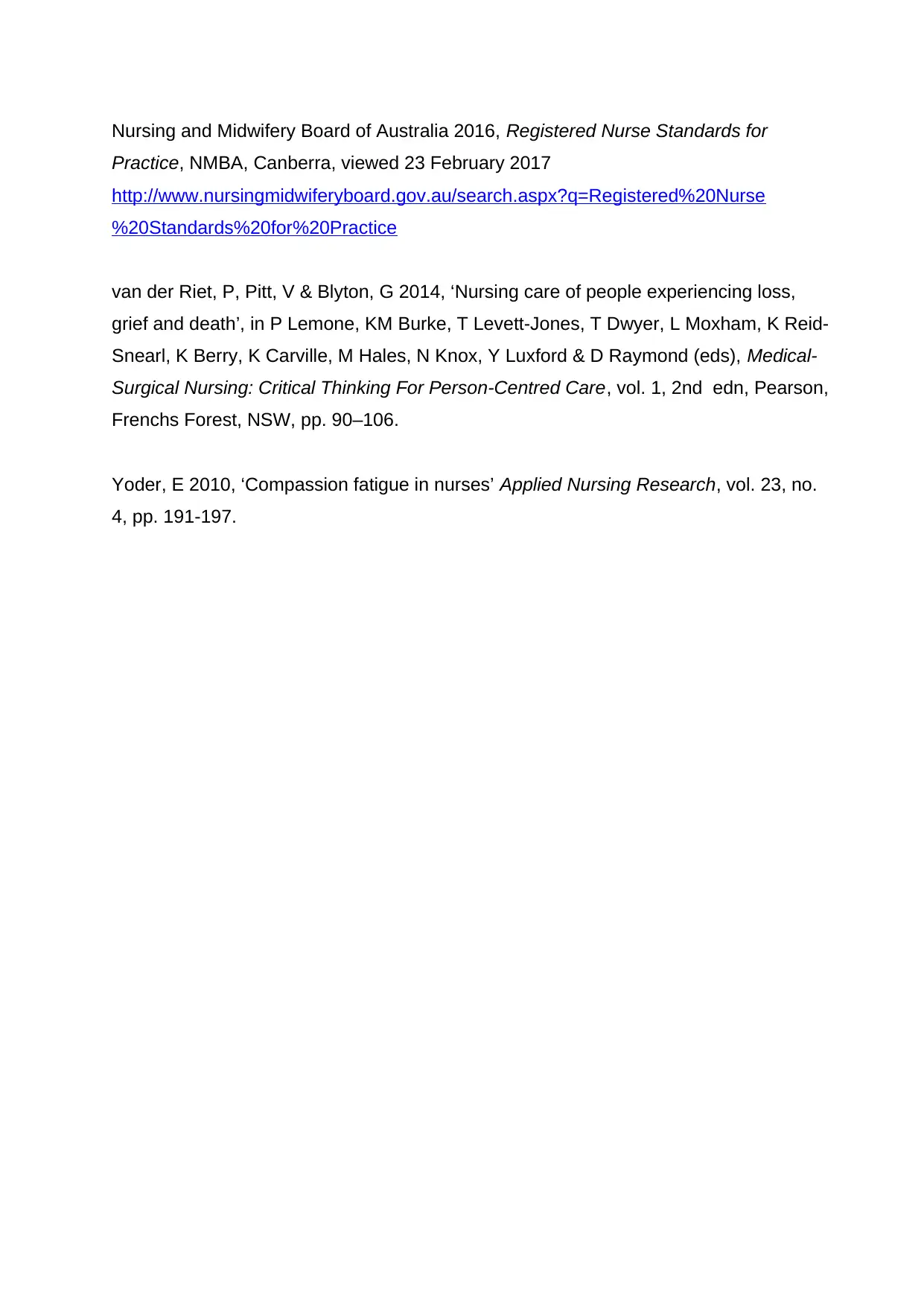
Nursing and Midwifery Board of Australia 2016, Registered Nurse Standards for
Practice, NMBA, Canberra, viewed 23 February 2017
http://www.nursingmidwiferyboard.gov.au/search.aspx?q=Registered%20Nurse
%20Standards%20for%20Practice
van der Riet, P, Pitt, V & Blyton, G 2014, ‘Nursing care of people experiencing loss,
grief and death’, in P Lemone, KM Burke, T Levett-Jones, T Dwyer, L Moxham, K Reid-
Snearl, K Berry, K Carville, M Hales, N Knox, Y Luxford & D Raymond (eds), Medical-
Surgical Nursing: Critical Thinking For Person-Centred Care, vol. 1, 2nd edn, Pearson,
Frenchs Forest, NSW, pp. 90–106.
Yoder, E 2010, ‘Compassion fatigue in nurses’ Applied Nursing Research, vol. 23, no.
4, pp. 191-197.
Practice, NMBA, Canberra, viewed 23 February 2017
http://www.nursingmidwiferyboard.gov.au/search.aspx?q=Registered%20Nurse
%20Standards%20for%20Practice
van der Riet, P, Pitt, V & Blyton, G 2014, ‘Nursing care of people experiencing loss,
grief and death’, in P Lemone, KM Burke, T Levett-Jones, T Dwyer, L Moxham, K Reid-
Snearl, K Berry, K Carville, M Hales, N Knox, Y Luxford & D Raymond (eds), Medical-
Surgical Nursing: Critical Thinking For Person-Centred Care, vol. 1, 2nd edn, Pearson,
Frenchs Forest, NSW, pp. 90–106.
Yoder, E 2010, ‘Compassion fatigue in nurses’ Applied Nursing Research, vol. 23, no.
4, pp. 191-197.
Paraphrase This Document
Need a fresh take? Get an instant paraphrase of this document with our AI Paraphraser
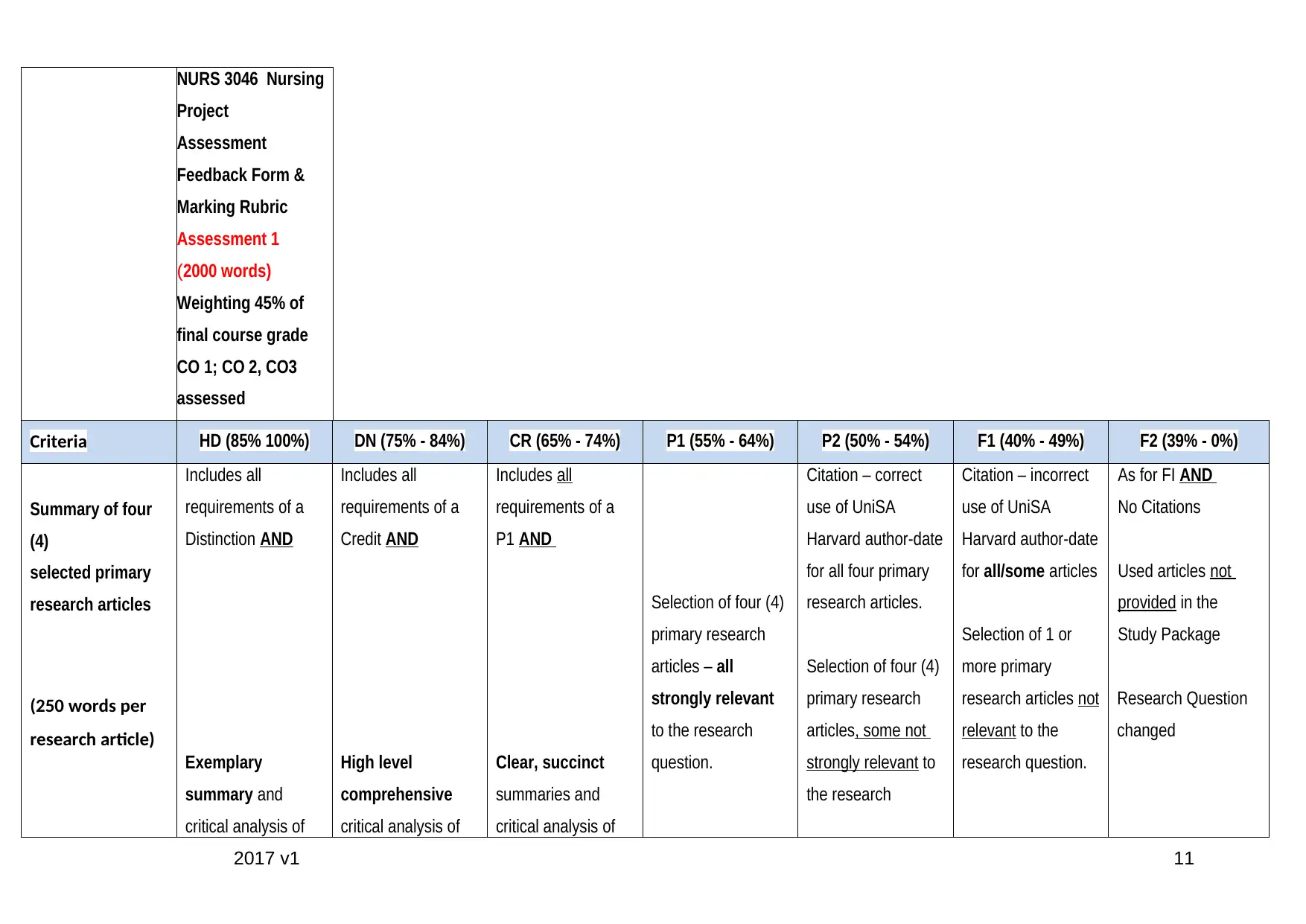
NURS 3046 Nursing
Project
Assessment
Feedback Form &
Marking Rubric
Assessment 1
(2000 words)
Weighting 45% of
final course grade
CO 1; CO 2, CO3
assessed
Criteria HD (85% 100%) DN (75% - 84%) CR (65% - 74%) P1 (55% - 64%) P2 (50% - 54%) F1 (40% - 49%) F2 (39% - 0%)
Summary of four
(4)
selected primary
research articles
(250 words per
research article)
Includes all
requirements of a
Distinction AND
Exemplary
summary and
critical analysis of
Includes all
requirements of a
Credit AND
High level
comprehensive
critical analysis of
Includes all
requirements of a
P1 AND
Clear, succinct
summaries and
critical analysis of
Selection of four (4)
primary research
articles – all
strongly relevant
to the research
question.
Citation – correct
use of UniSA
Harvard author-date
for all four primary
research articles.
Selection of four (4)
primary research
articles, some not
strongly relevant to
the research
Citation – incorrect
use of UniSA
Harvard author-date
for all/some articles
Selection of 1 or
more primary
research articles not
relevant to the
research question.
As for FI AND
No Citations
Used articles not
provided in the
Study Package
Research Question
changed
2017 v1 11
Project
Assessment
Feedback Form &
Marking Rubric
Assessment 1
(2000 words)
Weighting 45% of
final course grade
CO 1; CO 2, CO3
assessed
Criteria HD (85% 100%) DN (75% - 84%) CR (65% - 74%) P1 (55% - 64%) P2 (50% - 54%) F1 (40% - 49%) F2 (39% - 0%)
Summary of four
(4)
selected primary
research articles
(250 words per
research article)
Includes all
requirements of a
Distinction AND
Exemplary
summary and
critical analysis of
Includes all
requirements of a
Credit AND
High level
comprehensive
critical analysis of
Includes all
requirements of a
P1 AND
Clear, succinct
summaries and
critical analysis of
Selection of four (4)
primary research
articles – all
strongly relevant
to the research
question.
Citation – correct
use of UniSA
Harvard author-date
for all four primary
research articles.
Selection of four (4)
primary research
articles, some not
strongly relevant to
the research
Citation – incorrect
use of UniSA
Harvard author-date
for all/some articles
Selection of 1 or
more primary
research articles not
relevant to the
research question.
As for FI AND
No Citations
Used articles not
provided in the
Study Package
Research Question
changed
2017 v1 11
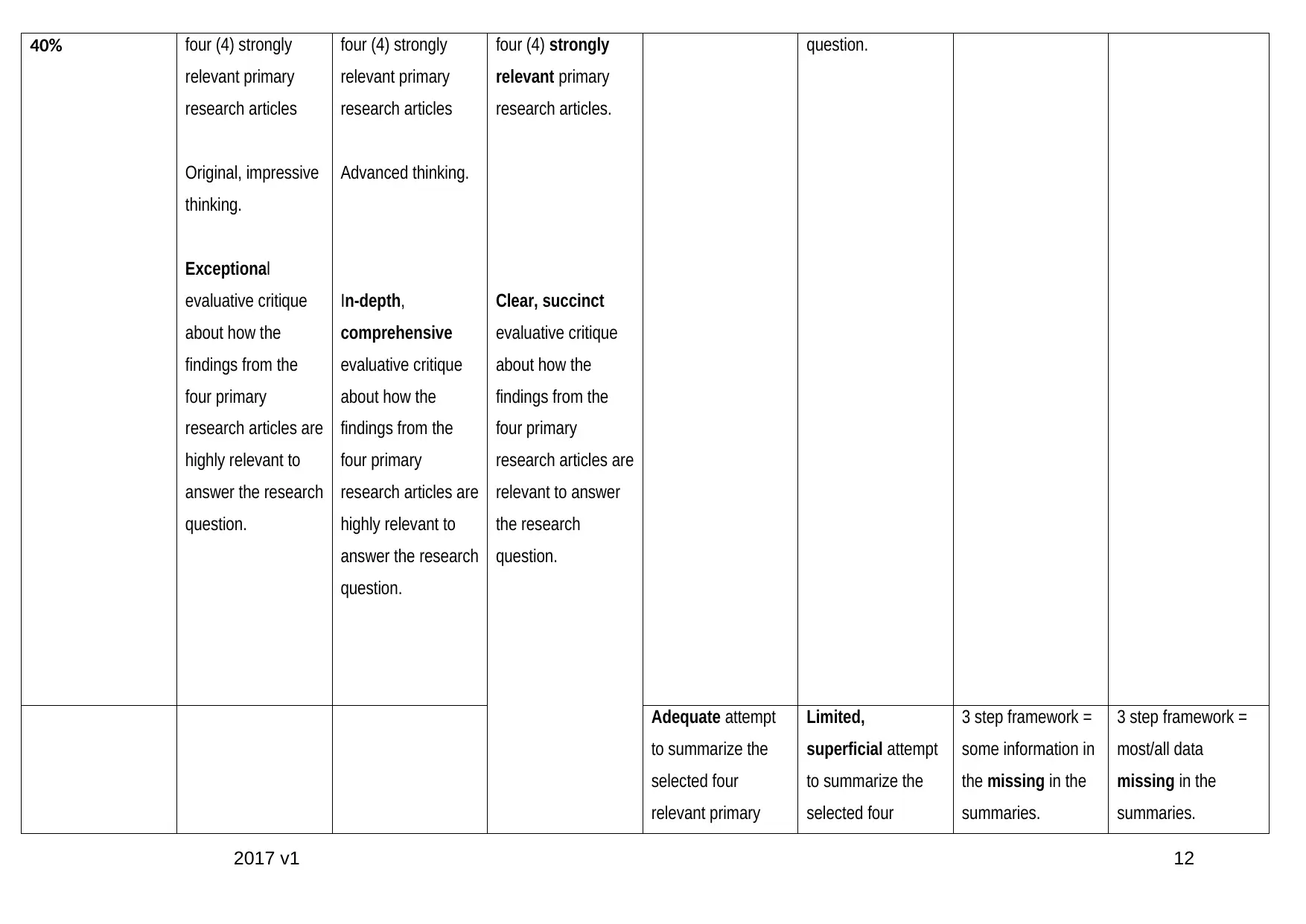
40% four (4) strongly
relevant primary
research articles
Original, impressive
thinking.
Exceptional
evaluative critique
about how the
findings from the
four primary
research articles are
highly relevant to
answer the research
question.
four (4) strongly
relevant primary
research articles
Advanced thinking.
In-depth,
comprehensive
evaluative critique
about how the
findings from the
four primary
research articles are
highly relevant to
answer the research
question.
four (4) strongly
relevant primary
research articles.
Clear, succinct
evaluative critique
about how the
findings from the
four primary
research articles are
relevant to answer
the research
question.
question.
Adequate attempt
to summarize the
selected four
relevant primary
Limited,
superficial attempt
to summarize the
selected four
3 step framework =
some information in
the missing in the
summaries.
3 step framework =
most/all data
missing in the
summaries.
2017 v1 12
relevant primary
research articles
Original, impressive
thinking.
Exceptional
evaluative critique
about how the
findings from the
four primary
research articles are
highly relevant to
answer the research
question.
four (4) strongly
relevant primary
research articles
Advanced thinking.
In-depth,
comprehensive
evaluative critique
about how the
findings from the
four primary
research articles are
highly relevant to
answer the research
question.
four (4) strongly
relevant primary
research articles.
Clear, succinct
evaluative critique
about how the
findings from the
four primary
research articles are
relevant to answer
the research
question.
question.
Adequate attempt
to summarize the
selected four
relevant primary
Limited,
superficial attempt
to summarize the
selected four
3 step framework =
some information in
the missing in the
summaries.
3 step framework =
most/all data
missing in the
summaries.
2017 v1 12
⊘ This is a preview!⊘
Do you want full access?
Subscribe today to unlock all pages.

Trusted by 1+ million students worldwide
1 out of 18
Related Documents
Your All-in-One AI-Powered Toolkit for Academic Success.
+13062052269
info@desklib.com
Available 24*7 on WhatsApp / Email
![[object Object]](/_next/static/media/star-bottom.7253800d.svg)
Unlock your academic potential
Copyright © 2020–2026 A2Z Services. All Rights Reserved. Developed and managed by ZUCOL.





